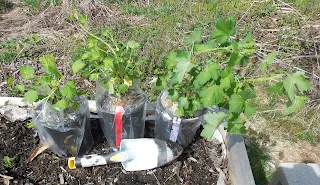The repetitive act of pulling potatoes out of the bag and cutting them into golf-ball sized chunks was a salve for Amira’s soul.
“You said you wanted to pick my brain about gardening” Sarah reminded her.
“Yes. My mother and I lived with my aunt in a small village in Bosnia for two years during the civil war. I was twelve at the time, so of course I didn’t pay much attention. But my aunt used to look at the trees and the flowers to decide when to plant her garden” Amira said. “I wondered if you did anything like that?”
“Civil war?” Sarah asked.
Amira shot Sarah a glance. Of course she didn’t know about the Bosnian civil war.
“After the Iron Curtain fell, Yugoslavia broke into several smaller countries. Bosnia -Herzegovina was one of those countries. No one group was in the majority. Basically, it was about a third Muslim, a third Serbian/Orthodox and a third Croat-Catholic. An election was held and the Serbs rejected the results and started a war.”
“My father had a small farm and cafe in an area that was primarily Serb. He also worked part-time in a factory. He was arrested. We were told that to get him out of prison we had to sign-over the farm and cafe to the prison warden” Amira said, bitterness creeping into her voice.
“We moved to Sarajevo, which is a very large city. We thought we could be safe. But we weren’t” she continued, her voice was flat and emotionless.
“My father sent my mother and me to stay with my aunt while he and my brother stayed in Sarajevo. I never saw them again” Amira said. “Snipers got my father. My brother was conscripted and went missing-in-action.”
Sarah continued to cut potatoes.
Amira looked over. There were tears in Sarah’s eyes.
“I am sorry” Sarah said. “I didn’t know.”
“It is not something that is easy to share” Amira admitted.
Sarah nodded her understanding.
“But we can talk about happy things...like gardening” Amira offered.
Sarah nodded, and then started talking about tulips and potatoes, lilacs or peonies and corn, Black Locust and tomatoes and beans, pumpkins and okra and wild roses*.
Evan was mesmerized as he stood between the handles of the large rotary tiller.
The rumble and shaking of the tiller drowned out everything else. The task demanded just enough attention to satisfy his OCD streak. He could see why men liked riding motorcycles!!! Video games just couldn’t capture the joy….
Blain was driving pegs and stretching cord to mark the rows across the land as soon as Evan finished tilling a strip. He was following up with a heavy hoe and making divots every fifteen inches. The seed potatoes would be planted in the divots.
“How is Walter?” Sarah asked.
“Much better” Amira said. “Copperhead Cove agrees with him.”
“He walks for hours and gets sunshine. He brings home mushrooms and greens and they go into the soup. Let me know if you need any greens. He brings home more than we can eat” Amira laughed.
“Yes, please. I would love greens. I am afraid our diet suffers during spring planting” Sarah said.
Amira paused, thoughtfully. She was looking at Evan and the tiller.
“You know, there is no reason Blain and Evan can’t split their time between my garden plots and yours” Amira observed.
“Well, there sort of is, at least for now. You need to plant at least two of your plots to potatoes and you are way behind. Maybe they can bounce back-and-forth once you are caught up” Sarah pointed out.
Amira rubbed her chin, deep in thought.
“In that case, maybe I can come over and help you plant your gardens while Blain and Evan are working on ours. Blain said it would be a train-wreck if Walter or I were in the gardens while he was working Evan” Amira said.
“I can’t think of a better way for me to learn how to garden in Tennessee than to be your helper...if you will let me” Amira concluded.
Sarah instantly saw the advantages. Having two people...her daughter Mary being too young to do everything that needed to be done, would save a lot of time in just the picking-up and putting-down of tools. And humans, especially women, are social animals. Work can be a joy when you are doing it with somebody whose company you enjoy.
"And when do you want to move the plants you sent me? I am afraid I already planted them..." Sarah asked.
"Please, keep them as a gift. I can get starts from you after they are growing but I think that to keep moving them will stunt them" Amira said. Then, as an after thought "That is, if you want them. Not everybody has room for fruit bushes."
"I will be honored to accept them" Sarah replied. Maybe Amira wasn't such a dragon after all.
*Note from ERJ: These pairings are my best guesses. Please don't take-them-to-the-bank.
The study of the order of biological progression through the season is sometimes called "Phenology". Using biological markers makes some sense but plants cannot predict the future. The timing-and-order are related to heat-accumulation and the need to be available to keystone pollinator insects and to hit the same time-window as other plants of the same species.
The pairing that is shakiest is Black Locust-tomatoes. Every once in a while, the Black Locust gets whacked by the frost. If you roll-the-dice and plant your tomatoes early, it is good practice to have extra plants that you keep under cover...just in case.

